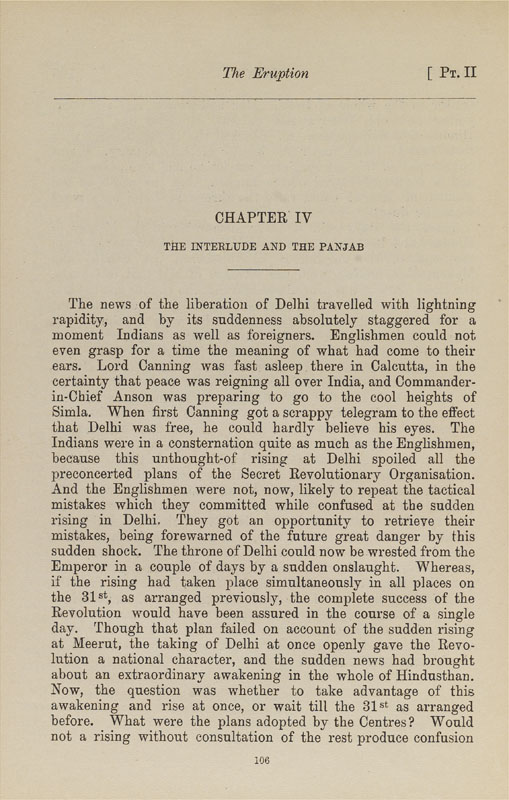le Eruption
Pt. II
CHAPTER IV
THE INTERLUDE AND THE PANJAB
The news of the liberation of Delhi travelled with lightning
rapidity, and by its suddenness absolutely staggered for a
moment Indians as well as foreigners. Englishmen could not
even grasp for a time the meaning of what had come to their
ears. Lord Canning was fast asleep there in Calcutta, in the
certainty that peace was reigning all over India, and Commander-
in-Chief Anson was preparing to go to the cool heights of
Simla. When first Canning got a scrappy telegram to the effect
that Delhi was free, he could hardly believe his eyes. The
Indians were in a consternation quite as much as the Englishmen,
because this unthought-of rising at Delhi spoiled all the
preconcerted plans of the Secret Revolutionary Organisation.
And the Englishmen were not, now, likely to repeat the tactical
mistakes which they committed while confused at the sudden
rising in Delhi, They got an opportunity to retrieve their
mistakes, being forewarned of the future great danger by this
sudden shock. The throne of Delhi could now be wrested from the
Emperor in a couple of days by a sudden onslaught. Whereas,
if the rising had taken place simultaneously in all places on
the 31st, as arranged previously, the complete success of the
Revolution would have been assured in the course of a single
day. Though that plan failed on account of the sudden rising
at Meerut, the taking of Delhi at once openly gave the Revo¬
lution a national character, and the sudden news had brought
about an extraordinary awakening in the whole of Hindusthan.
Now, the question was whether to take advantage of this
awakening and rise at once, or wait till the 31 st as arranged
before. What were the plans adopted by the Centres? Would
not a rising without consultation of the rest produce confusion
106
|








